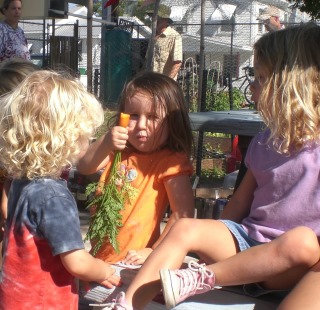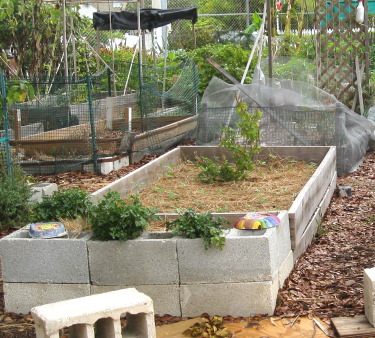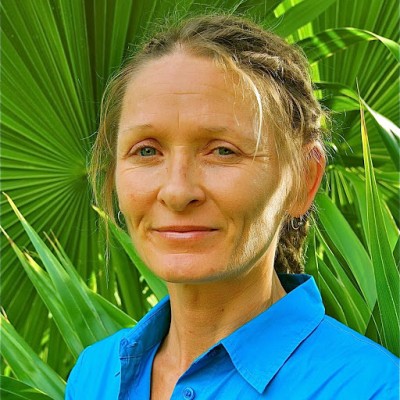What Does Climate Change Have To Do With CSA? What is CSA?
by Vicki Boguszewski…

I love my CSA! A CSA is a Community Supported Agriculture program. My CSA supports organic farming in the Redlands Historic Agriculture District of Homestead, Florida. It is called the Bee Heaven Farm CSA. What does it have to do with climate change?
Climate Change is the acceleration of the natural processes of the Earth by human activity and impacts the human family in both direct and indirect ways. One of the activities which most strongly influences the rate and subsequent acceleration of change in the climate of the Earth is the burning of fossil fuels. Have you ever considered the carbon foot print of your lunch? How far did your food travel to arrive at your plate? Were petrochemicals used in the growing and production of the food itself, in addition to its packaging, and travel resources? Those questions identify the impact of our food choices on one aspect of what is popularly known as climate change.
Food security impacts of climate change can take on a variety of forms. If sea level rise in the community of production caused salt water intrusion into agricultural water supplies or damaged the root systems of crops themselves the price of the food to you could increase dramatically. If drought stunted production or increased scarcity of resources in the community of production the exportation of the product produces a loss of resources for the grower. In these cases the impact of climate change made your food either an economic liability or much needed lost resource to someone else, who might now have a few dollars but is unable to access food to buy because it has been exported for income.
In preparation for the start of the Community Garden Key West, I participated in a VWA, volunteer work exchange, on a CSA farm in Tampa, FL called the Sweetwater Organic Farm. The Farm’s Head Farmer, Rick, had served as an Organic Farm Certifier for many years and consulted on projects in Cuba after the Soviet Oil ‘Crisis’ made petrochemicals an ‘historic reality’ on the island. For five weeks I worked on the farm learning planting, growing, and harvesting skills and techniques from Rick’s crew. Rick’s assistant, Farmer Mike, had a natural knack for green and was becoming a master raw foodlist; he offered some inspiring lessons in eating. Sundays were Member Pick Up days at the Farm. The harvest would be set out in baskets and bins throughout the barn and chalkboard signs would tell members what quantities to pick up of each item. As the members filled their bags, the barn filled with chatter and laughter and the spirit of the CSA- sharing.

In my current beloved CSA, the Homestead Farmers kindly arrange for my share and those of the other members in the community surrounding our pick up location, to be delivered. From November through April I have the benefit of going to a local pick up location and finding a box labeled ‘small share’, just for me. I also find a newsletter telling me what is in my box, who provided each item, and where they are in Florida. I also find recipes, updates on the organic food movement, news about the farms and farmers in the CSA, and invitations to special events, like the upcoming ‘Farm Gleaning Party and Potluck’. On this special day, Farmer Margie of Bee Heaven Farm will offer hay rides and allow the members to harvest remaining crops or ‘glean’ from the fields. The day is filled with discovery adventures and local musicians join in the celebration. Pot luck lunch is served in the barn and Farmer Robert from the Possum Trot Farm usually has a grilled corn on the cob stand going nearby on the Farm. Members are encouraged to bring a ‘brew’ (hot or iced tea) and return any empty boxes from the season. Summer time in the Redlands is too hot for veggie growing, but tropical fruits thrive and a selection is normally available for sale in the barn. Some of the other goodies from the CSA like cookbooks, Goat’s Milk Soaps, Herb Teas, and dried tropical fruit snacks are also available for purchase.
How does it work? At the beginning of the Farming Season- September here in South Florida- members sign up or renew their memberships for the season. In Monroe County, the fee for a large share is $840 and for a small share is $580. Boxes begin to arrive in November and are filled with bounty of the farmers whom the membership fees support. The early buy in allows the farms economic security and some stability for the season, and guarantees the members product and the bounty of benefits I have just described. The delivery continues weekly for 20 weeks with a short break for holidays. In the upcoming 2015-2016 season a bi-weekly option will be available.
I love my CSA! It offers me local food security. My CSA offers local farmers economic security, supports organics in the fragile growing area just upstream from my own Florida Residence County (reducing agrichemical runoff in the Everglades and Florida Bay), and it does not threaten food security elsewhere or require extensive resources impacting global health. Community Supported Agriculture is a homegrown climate change adaptation tool.

Vicki Boguszewski earned a Masters of Public Health (MPH) from Florida International University FIU) in 2012 following an internship with the Florida Department of Health-Monroe. Currently, she practices public health in Monroe County, Florida, is a member of the Florida Public Health Association and a certified health education specialist (CHES).
Vicki serves on the Monroe County Climate Change Action Committee as Vice Chair of the Committee, the State of Florida Department of Health Building Resiliency Against Climate Effects (BRACE) Technical Advisory Group, and the Florida Institute for Health Innovations (FIHI) Kresge grant Sea Level Rise (SLR) Modeling Project Steering Committee.
She is conducting an assessment of perspectives on weather related health impacts among professionals in the Monroe County health care community to produce a tailored Adaptation Guide for the same group and was a steering committee member for the Florida Public Health Institute’s South East Florida Regional Climate Action Plan (CAP) Health Impact Assessment (HIA).
Vicki is a founding Board member of the Green Living and Energy Education Community Garden of Key West (CGKW). As a member of the Key West Poetry Guild (KWPG) since 1996, she has performed and published original poetry and art locally and abroad.
Her undergraduate degree is from Temple University (TU) in Philadelphia, PA, where she earned a Bachelor of Arts (BA) in Cultural Anthropology, magna cum laude, 1995, with a focus in Latin America and the Caribbean. She has traveled within the Caribbean region and volunteered with a number of grassroots environmental organizations, including Reef Relief, Save-A-Turtle, and the Dominican Conservation Association in the Commonwealth of Dominica, EC.



What an inspirational story! I’m glad you and CSA exist, Vicki.